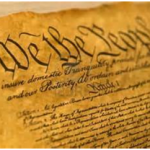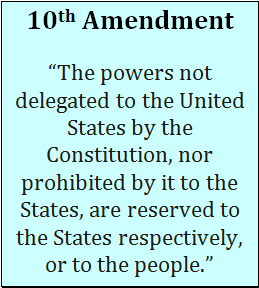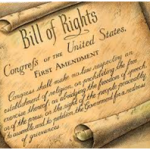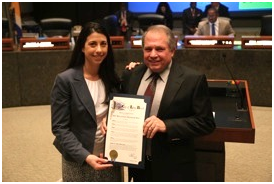“A Piece of My Mind”
February, 2017 Newsletter

Advancing Christian Faith and Values,
Defending Religious Liberty for All,
Supporting Civility and the Common Good
through Preaching, Teaching, Writing,
Activism and Reasoned Conversations
Choice Words at a Time of Government Change
 “… in a democracy, civility is not an option, it’s a precondition that makes our system possible . . . Without civility, political discourse becomes hostile and polarized. In the resulting chaos we become vulnerable to tyranny.” – Charles Colson
“… in a democracy, civility is not an option, it’s a precondition that makes our system possible . . . Without civility, political discourse becomes hostile and polarized. In the resulting chaos we become vulnerable to tyranny.” – Charles Colson
 Good Government: “…a wise and frugal Government, which shall restrain men from injuring one another,
Good Government: “…a wise and frugal Government, which shall restrain men from injuring one another,
shall leave them otherwise free to regulate their own pursuits of industry and improvement, and shall not take from the mouth of labor the bread it has earned.”
– Thomas Jefferson (1st Inaugural Address, 1801)
Bible Insight—Prayer for Political Leaders
First of all, then, I urge that supplications, prayers, intercessions, and thanksgivings be made for all people, for kings and all who are in high positions, that we may lead a peaceful and quiet life, godly and dignified in every way. This is good, and it is pleasing in the sight of God our Savior, who desires all people to be saved and to come to the knowledge of the truth.
– 1 Timothy 2:1-4 (English Standard Version)
No presidential election period and transition period that I’ve followed (1960+) has been as acrimonious and challenging as the recent one. I’ve been pondering the above scripture throughout the recent political transition and start of a new administration. Notice these points:
1. Prayer for government leaders should be a top priority.
“First of all”
First things first. Prayer for government leaders is at the top of the list.
This priority falls primarily on the church. While we should certainly pray for those who lead us in our private and family and small group prayers, Paul is speaking about the church’s responsibility (3:15). Prayer for those in authority should be part of a church’s weekly public prayers.
2. The prayers we offer should have several dimensions.>
“supplications, prayers, intercessions, and thanksgivings”
“Supplications” = presenting our needs to God, in relationship to rulers.
“Prayers” = this general word for prayer stresses reverence before God.
“Intercessions” = we pray in behalf of those who rule over us and for those sufffering throughout the world due to government oppression and injustice.
“Thanksgivings” = this is the hard part—thanksgiving for our rulers. But also thanksgiving to God for being “Lord of human affairs.” And thanksgiving for our freedoms and all that is good in human government (1 Peter 2:13-14).
I don’t think in terms of four separate prayers, but our prayers for those who lead us should touch these four dimensions.
3. All in key positions should be the subjects of our prayers.
“for kings and all who are in high positions”
I recently gave the invocation at my church with these words:
We pray for our new president and his administration and for the new Congress in session. Give all who lead our country a special measure of the wisdom that comes from above—wisdom that is pure, peace-loving, considerate, submissive, full of mercy and good fruit, impartial and sincere [James 3:17]. Watch over them so we might live peaceful, quiet and godly lives in freedom and safety.
Pastor Greg Laurie offered a prayer at a pre-inaugural prayer breakfast. It is a great model of praying for those in “lesser” roles of authority (1 Peter 2:14).
Almighty God, we also pray that You would instill in the governors of states, and the mayors of cities and towns, and civil servants, those that serve in school boards and councils, and all administrative and governmental authorities, that they would have the spirit of wisdom, and love, and justice, and compassion, that with steadfast purpose they may faithfully serve in their offices to promote the well-being of all people.
Just think of the vast difference between those who lead our nation today and those whom Paul had in mind in the Roman Empire when he said to pray!
 Nero, who ruled 54-68 AD, was no Jefferson or Madison or Reagan! He committed suicide after being declared a public enemy by the Roman Senate. He was the first emperor to persecute Christianity, and his oppression of Christians in Rome led, according to tradition, to the martyrdoms of the Apostles Peter and Paul.
Nero, who ruled 54-68 AD, was no Jefferson or Madison or Reagan! He committed suicide after being declared a public enemy by the Roman Senate. He was the first emperor to persecute Christianity, and his oppression of Christians in Rome led, according to tradition, to the martyrdoms of the Apostles Peter and Paul.
Christians and non-Christians could easily regard Nero as utterly undeserving of any honor as emperor. Yet there he was as the one who should be held in prayer (and honored, according to 1 Peter 2:17). By comparison, it should be much easier to honor and pray for almost all of our contemporary leaders.
[NOTE: An “antichrist” government such as is described metaphorically in Revelation 12-13 is a very different circumstance.]
4. The goal of our prayers is that we might live tranquil, godly lives.
“that we may lead a peaceful and quiet life, godly and dignified
in every way”
Our prayers is for a society characterized by “shalom” in all its wonderful dimensions. In this environment we can pursue our vision of godliness and nurture qualities respected by all as marks of human dignity and integrity.
5. A society marked by “shalom” pleases God, because (among other reasons we could give) it is conducive to Christian evangelism.
“This is good, and it is pleasing in the sight of God our Savior,
who desires all people to be saved”
Social turmoil is not conducive to Christian evangelism. When God answers our prayers and gives social peace, safety and freedom, the outreach ministries of the church, foreign and at home, go forward more successfully. God uses times of both tranquility and persecution for his purposes.
 Revivals don’t come from Government!
Revivals don’t come from Government!
A prominent Evangelical pastor said at an inaugural event he hoped Donald Trump’s win would usher in a new “Jesus Movement” unseen since the 1970’s.
Don’t expect that! Don’t even pray for it!
Martin Luther’s distinction between God’s “Two Kingdoms” can guide us. From God’s rule through secular government we expect justice and safety. But we pray for revival through spiritual institutions which God also rules.
I long for another “visitation by God” such as happened in the 60’s and 70’s—what became known as the “Jesus Movement.” Many were converted to Jesus, especially youth and youthful “drop-outs.” Many churches were changed for the better, especially in worship. Our society benefitted as well.
But neither that movement or any future revival like it is spawned by secular leaders. We are mixing chalk and marbles to expect this. Secular rulers should defend our freedoms and keep us safe from crime and persecution. But do the Holy Spirit’s work? No.
Pondering The Electoral College
By Donald P. Shoemaker
 “Each State shall appoint, in such Manner as the Legislature thereof may direct, a Number of Electors, equal to the whole Number of Senators and Representatives to which the State may be entitled in the Congress…”
“Each State shall appoint, in such Manner as the Legislature thereof may direct, a Number of Electors, equal to the whole Number of Senators and Representatives to which the State may be entitled in the Congress…”
– Article 2, Section 2 of the US Constitution
“The Electors shall meet in their respective states, and vote by ballot for President and Vice-President…
…The person having the greatest number of votes for President, shall be the President, if such number be a majority of the whole number of Electors appointed; and if no person have such majority, then from the persons having the highest numbers not exceeding three on the list of those voted for as President, the House of Representatives shall choose immediately, by ballot, the President. But in choosing the President, the votes shall be taken by states, the representation from each state having one vote…”
– 12th Amendment to the US Constitution [underlining mine]
I’m a majoritarian by nature. It would seem the idea of having the Electoral College pick the President of the United States would be contrary to my thinking. And so it has been, in the earlier version of who I am.
Over the years, however, I’ve come to learn more about Federalism—a system of constitutional government whereby power is shared between the several states and the national government in Washington.
Before I say more, let’s be clear on two points:
(1) In our country’s fifty-eight presidential elections the President of the United States has never been chosen by the popular vote. It’s comfortable when the electoral and popular vote totals agree, but the choice of president and vice president is determined by electoral votes.
(2) A plurality is not a majority. No candidate won a majority of the popular vote in the presidential elections of 1992, 1996, 2000 and 2016. A run-off election would be needed to ensure the will of the majority, if indeed we were to have the presidency decided by a majority of the popular vote. *
 As the power and influence of the federal government has grown, the ideal of federalism has shrunk and the significance of the states and of the people has gotten smaller, contrary to the intent of the 10th Amendment. Direct popular election of the president would be a giant step away from federalism. (It would also ruin all the excitement of election night coverage on TV, where now the election is like an intense national Monopoly game—“Who will get North Carolina Avenue or put a hotel on Pennsylvania Avenue?”)
As the power and influence of the federal government has grown, the ideal of federalism has shrunk and the significance of the states and of the people has gotten smaller, contrary to the intent of the 10th Amendment. Direct popular election of the president would be a giant step away from federalism. (It would also ruin all the excitement of election night coverage on TV, where now the election is like an intense national Monopoly game—“Who will get North Carolina Avenue or put a hotel on Pennsylvania Avenue?”)
The election of the president is an exercise in federalism. The president is picked by the states through their electors. Even if the selection of a president went before the House of Representatives because no candidate received a majority in the Electoral College, the representatives would vote by state—one vote per state. This is another strong indicator of federalism.
A state can direct its electors as it chooses. It can require that all vote for the candidate who wins the state (“winner takes all”). Or the electors can be proportioned according to the results of the vote within the state. A state could determine that the winner of each congressional district receive one vote, with the two “extra” votes going to the candidate that receives the most votes throughout the whole state. This is done in Maine and Nebraska. Or, as some suggest, states could direct their electors to vote for the candidate who wins the national popular vote (which would lessen “federalism” and could easily negate how a state’s voters actually voted, in my opinion).
Erwin Chemerinsky, distinguished Dean of the School of Law at the University of California—Irvine, recently argued that the Electoral College is, well, unconstitutional unless a state proportions its electors based on the outcome of its popular vote. He says “winner takes all” violates the “equal protection” provision of the 5th Amendment. I’d never make a claim to legal knowledge approximating that of Mr. Chemerinsky, but it appears to me that amendments to the Constitution that alter statements in the Constitution would do so in ways that are clear. For example, the 17th Amendment clearly changed Article 1 of the Constitution by requiring that U.S. senators be elected by popular vote in the several states, not chosen by state legislatures.
If the “equal protection” clause of the 5th Amendment bans “winner takes all” of a state’s electors, then it should also ban how U.S. senators are currently proportioned. The Constitution (Article 1, Section 2) gives each state two senators, regardless of its population. This obviously gives less populated states stronger proportional representation in the Senate than more populated states. **
One unfortunate result of the current electoral system is that candidates simply ignore two of our largest states, California and New York. The popular vote for president in these two states has been strongly Democratic for several elections, giving the candidates no reason to campaign in these states. (Fundraising in California is obviously unaffected!) Proportional selection of electors in these states would change that.
Federalism (as with “checks and balances” and “separation of powers”) reflects the caution of the nation’s Founders against concentration of power. Working properly, the Constitution limits the power of the national government and enhances the rights of the states and of the people. This is as it should be. ***
As a result, I support in principle the concept of the Electoral College. It is not a perfect concept. Then again, nothing in the Constitution is.
* Third-party candidates can affect who wins the popular vote and the electoral vote. George H. W. Bush might have won reelection in 1992 had Ross Perot not been on the ballot. Al Gore certainly would have won the presidency in 2000 had Ralph Nader not been on the ballot in Florida.
** Wyoming has one senator for every 282,000 residents; California has one senator for every 18,627,000 residents (2010 census). That’s a disproportion of 66x!
*** Federalism does not mean states are always supreme. I think of the important interventions by the national government during the great civil rights struggle.
“Everybody can be great because anybody can serve. You don’t have to have a college degree to serve. You don’t have to make your subject and your verb agree to serve…. You don’t have to know the second theory of thermodynamics in physics to serve. You only need a heart full of grace. A soul generated by love.”
– Dr. Martin Luther King, Jr.
January 16 – “Religious Freedom Day” in America
 “Religious freedom is a principle based not on shared ancestry, culture, ethnicity, or faith but on a shared commitment to liberty — and it lies at the very heart of who we are as Americans.”
“Religious freedom is a principle based not on shared ancestry, culture, ethnicity, or faith but on a shared commitment to liberty — and it lies at the very heart of who we are as Americans.”
– President Barack Obama’s “Presidential Proclamation” on January 13, 2017

Don with Councilwoman Stacy Mungo
2017 Religious Freedom Day Proclamation
Prepared for the Long Beach, CA City Council
By Donald P. Shoemaker
(Final wording is determined by the Office of the Mayor)
WHEREAS the Virginia Statute of Religious Freedom, our country’s first legal safeguard for religious liberty, was adopted on January 16, 1786; and
WHEREAS since 1994 the President of the United States has issued a Proclamation on the importance of religious liberty, which designates January 16 as Religious Freedom Day; and
WHEREAS our nation’s founders recognized the importance of religious freedom and secured this liberty in the words of the First Amendment, declaring that “Congress shall make no law respecting an establishment of religion, or prohibiting the free exercise thereof”; and
WHEREAS the free exercise of religion has undergirded the social efforts of many Americans, notably Dr. Martin Luther King, Jr., whose birthday on January 15 we commemorate each year; and
WHEREAS the United Nation’s Universal Declaration of Human Rights (Article 18) declares, “Everyone has the right to freedom of thought, conscience and religion” including the right “to manifest his religion or belief in teaching,
practice, worship and observance” and, regardless of this, religious freedom continues to face challenges, persecution and coercion, violent and non-violent, around the world; and
WHEREAS our country has embraced a unique tradition of religious liberty that has prevented religious domination, conflict and persecution and nurtured an environment where religion has flourished and where people have been left free to choose which faith they shall follow or none at all;
NOW, THEREFORE the City Council of Long Beach, California, hereby declares January 16, 2017 to be “Religious Freedom Day” in our community.
We encourage city government, community groups, schools and places of worship to reaffirm their devotion to the principles of religious freedom and educate and reflect on the importance of religious liberty so it may continue secure as part of our nation’s fabric.
We encourage citizens and government to be mindful of the principles of religious liberty in their decisions, attitudes and actions.
On this day let us give thanks for this precious right that has so profoundly shaped and sustained our Nation, and let us strengthen our efforts to share its blessings with oppressed peoples everywhere.
 Don’s Upcoming Ministries
Don’s Upcoming Ministries
January 31 (6:30 pm) and February 3 (9:30 am) – Teach on the Epistle to the Galatians at Women’s Bible Study, Grace Community Church of Seal Beach
March 1 – Ash Wednesday Service at Grace Community Church of Seal Beach
March 23 (7 pm) – Speak on “The Church, The State and the Law” for the “Protecting Religious Freedom” series by the South Coast Interfaith Council.
Website: www.donaldshoemakerministries.com
Contact me at: donaldshoemakerministries@verizon.net


